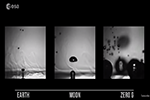Microgravity : the best place to study the boiling process
The June 16, 2020

RUBI Experience (Reference mUltiscale experiment for Boiling Investigation) was launched on the International Space Station on July, 2019. Today, researchers,with Catherine Colin from the Institut de Mécanique des Fluides of Toulouse (CNRS / Toulouse INP / UT3), review their project of the European Space Agency through an interview.
The boiling process
Boiling is a very common process in our everyday life. For instance, we usually boil water to cook or to clean. The boiling process is common in many engineering fields such as environmental applications and industrial chemical processes. Understanding the dynamics of boiling is essential to improve energy production and conversion in power plants, and to design future space applications like cryogenic fuel storage and propulsion.
Experience in space
On Earth the process happens too fast to be accurately observed and measured. But experiments conducted in low gravity environments, like on the International Space Station, allow us to observe phenomena like phase transition and the onset of bubbles much more clearly.
Such studies may lead to increase the energy efficiency of several application also here on Earth, from Power plants to thermal management systems used in electric vehicles, laptops, and smartphones just to cite a few examples.
RUBI Experience
RUBI Reference experiment for mUltiscale Boiling Investigation concept has been defined jointly by Darmstadt University, University of Pise, Aix - Marseille University, Université Libre de Bruxelles, EPFL Lausanne, IMFT and other international partners.
“The objective of this experiment is to study the growth and the detachment of an isolated bubble and the heat and mass transfers at the bubble foot for various wall superheating, liquid subcoolings and potentially in an electric field or in a shear flow.”
"Étude de la dynamique de bulles formées en paroi par injection ou ébullition : effet de la gravité et des forces hydrodynamiques", Thèse de Michel Thomas LEBON, 2016



